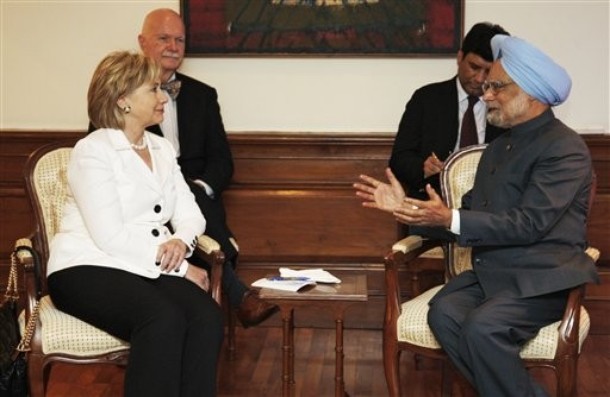Specifically, the joint statement committed the United States and China to ‘support the improvement and growth of relations between India and Pakistan’ and to ‘strengthen communication, dialogue and co-operation on issues related to South Asia and work together to promote peace, stability and development in the region.’ The Sino-US joint statement comes soon after an apparent softening of the US position on China’s territorial claims over India’s northeastern state of Arunachal Pradesh, where some see the US as sliding towards neutrality on the issue.
The Sino-US joint statement partly overshadowed Prime Minister Singh’s visit to Washington last week forcing Singh to ‘emphatically reiterate’ to his US hosts that China has no role in South Asia. As the Indian Foreign Ministry commented, a role for China in the Indo-Pakistan dispute ‘cannot be envisaged.’ For decades New Delhi has seen China as a major destabilising factor in the region, threatening its own predominance in South Asia. New Delhi still bitterly resents the strategic support that China has given Pakistan since the early 1960s, blaming China for emboldening Pakistan in its numerous conflicts with India and for arming Pakistan with nuclear weapons (reinforced by revelations last month that in 1982 China provided Pakistan with weapons grade uranium sufficient for two nuclear devices). In the last year or more China has stepped up pressure on India over their disputed border, particularly in relation to its claims over Arunchal Pradesh. Many in New Delhi believe that India is developing illegitimate security relationships with India’s other South Asian neighbours, including Nepal, Bangladesh and Sri Lanka as well as pursuing a strategy of maritime encirclement of India in the Indian Ocean through the so-called ‘String of Pearls.’
During the Bush administrations, the United States worked hard to develop a strategic partnership with India, crowned by last year’s nuclear agreement. This has been accompanied by considerable degree of security cooperation, including efforts to enhance India’s power projection capabilities. The US has explicitly endorsed India’s ambitions to take a leading security role in the Indian Ocean while also seeking to encourage India’s concerns over China’s intentions there. The US, it seems, sees the enhancement of India’s capabilities in the Indian Ocean as one way of helping to contain China’s strategic ambitions in East Asia.
It is unclear how these recent developments fit with US strategy. US State Department representatives sought to play down the Sino-US joint statement prior to Prime Minister Singh’s Washington visit, commenting that the joint statement was intended to refer to China’s concerns about Afghanistan. Obama too gave public assurances that the joint statement was not intended to endorse Chinese interference in South Asia.
However, New Delhi is unlikely to take these assurances at face value. Many in New Delhi are already distrustful of the US commitment to its relationship with India and resent the Democrat administration’s perceived bias towards China (in comparison with perceived support for India among the Republican ranks). Without a doubt the last few weeks have further reduced New Delhi’s trust in Washington as an essential partner in its long-running strategic rivalry with China. New Delhi is aware that Obama is playing from a weak hand in its dealings with China, needing China’s support not only on the economic front but also in Afghanistan. However, the US-China joint statements will confirm in some minds that when forced to choose between China and India, the United States will choose China. For all of Washington’s assurances, New Delhi may well conclude that it must reinforce its own efforts to counter China in South Asia and beyond. India’s assertive stance in the Indian Ocean, largely driven by fears of China, provides an indication of the potential significance of India’s insecurities to Australia.


your quote:
‘Many in New Delhi believe that India is developing illegitimate security relationships with India’s other South Asian neighbours, including Nepal, Bangladesh and Sri Lanka as well as pursuing a strategy of maritime encirclement of India in the Indian Ocean through the so-called ‘String of Pearls.’’
Why on earth is New Delhi concerned about India developing ‘illegitimate security’ around India???